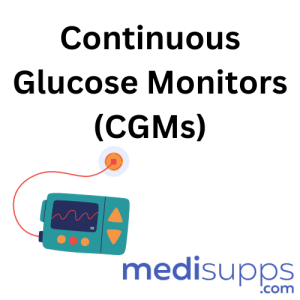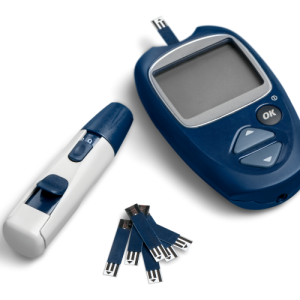
by Russell Noga | Updated December 15th, 2023
 If you’re living with diabetes, monitoring your blood sugar levels is an essential part of managing your condition. A glucose meter is a crucial tool to help you stay on track.
If you’re living with diabetes, monitoring your blood sugar levels is an essential part of managing your condition. A glucose meter is a crucial tool to help you stay on track.
But what about the costs and insurance coverage?
We’re here to guide you through the complexities of Medicare’s coverage for glucose meters, ensuring that you can make informed decisions and get the most out of your healthcare coverage.
So, let’s answer the question: does Medicare pay for a glucose meter? Let’s get started!
Key Takeaways
- Medicare Part B provides coverage for glucose meters, supplies and some continuous glucose monitors (CGMs) when prescribed by a physician.
- A doctor’s prescription is required to secure Medicare coverage of a glucose meter, with patients responsible for 20% of the cost.
- Alternative coverage options such as Medicare Advantage Plans or Medigap plans can provide additional benefits including vision, dental and prescription drug coverage.
 Understanding Medicare and Glucose Meter Coverage
Understanding Medicare and Glucose Meter Coverage
Managing diabetes effectively requires regular blood sugar testing. Medicare understands the importance of glucose monitoring and offers coverage for glucose meters and supplies under Part B.
It classifies glucose meters as durable medical equipment (DME) and provides coverage when prescribed by a physician. If you’re considering alternative blood sugar monitoring methods, you can reach out to Medicare directly or your Medicare Advantage plan to inquire about coverage for outpatient care options.
However, bear in mind that while Medicare provides coverage for traditional glucose meters, continuous glucose monitors (CGMs) might not always be covered. CGMs are devices worn on the body that continuously measure blood glucose levels.
Your physician will determine if you satisfy all eligibility standards for Medicare to cover a CGM. Medicare Part B also offers coverage for CGM supplies.
Medicare Part B and Glucose Meters
Medicare Part B provides coverage for a variety of blood sugar testing supplies, such as:
- Glucose monitors
- Lancets
- Glucose test strips
- Glucose control solutions
To be covered, both the healthcare provider and DME suppliers must accept Medicare assignment.
The Competitive Bidding Program is a Medicare initiative that affects glucose monitoring equipment and supplies. If you live in an area impacted by this program, you must:
- Use Medicare-contracted suppliers for glucose monitoring equipment and supplies
- Ensure that your doctor accepts assignment
- Make certain your doctor and supplier are enrolled in Medicare
This will help secure Medicare coverage for your insulin pump, glucose meter, and supplies.
 Continuous Glucose Monitors and Medicare
Continuous Glucose Monitors and Medicare
While Medicare does provide coverage for CGMs, the coverage requirements may vary depending on individual circumstances.
If your doctor determines that you meet all the eligibility criteria, Medicare will cover a CGM. Medicare Part B also covers CGM supplies.
However, keep in mind that Medicare might not cover all CGMs. In these cases, you may need to explore alternative coverage options or consider the out-of-pocket costs associated with purchasing a CGM without insurance coverage.
Obtaining a Glucose Meter Through Medicare
To acquire a glucose meter through Medicare, you’ll need a doctor’s prescription and must use a Medicare-enrolled supplier. Medicare provides coverage for glucose meters for individuals with both Type 1 and Type 2 diabetes.
You can locate a Medicare-enrolled supplier by visiting Medicare.gov/supplier or by inquiring with your doctor or DME supplier if they are enrolled in Medicare before obtaining a glucose meter.
You should be mindful of the costs associated with glucose meter coverage, like copayments, deductibles, and out-of-pocket expenses, as well as doctor charges.
 Prescription Requirements
Prescription Requirements
A doctor’s prescription is necessary for Medicare coverage of a glucose meter. The prescription should include the following information:
- Your name and Medicare number
- Diagnosis of diabetes
- Statement indicating medical necessity
- Type of glucose meter prescribed
- Frequency of testing
- Quantity of test strips and lancets required per month or quarter.
Medicare covers specific types and models of glucose meters based on a doctor’s prescription, including blood glucose monitors and associated accessories and supplies for both insulin-dependent and non-insulin dependent diabetics. It’s important to consult your doctor to identify the exact types and models Medicare covers.
Both specialists and primary care physicians can issue prescriptions for glucose meters to be covered by Medicare.
Finding a Medicare-Enrolled Supplier
Using a supplier enrolled in Medicare guarantees that your glucose meter will be covered. You can find Medicare-enrolled suppliers through the official Medicare tool at Medicare.gov, which provides a supplier directory for Medicare-approved suppliers of durable medical equipment.
The Medicare Durable Medical Equipment, Prosthetics, Orthotics, and Supplies (DMEPOS) Competitive Bidding Program is another factor to consider when obtaining a glucose meter. This program requires suppliers to submit bids for providing certain items and supplies to individuals with Medicare residing in or visiting competitive bidding areas.
 Costs Associated with Glucose Meter Coverage
Costs Associated with Glucose Meter Coverage
Patients are responsible for 20% of the Medicare-approved amount for glucose meters and supplies, and out-of-pocket expenses may vary depending on individual situations and supplier selections. In 2021, Medicare Part B covered 80% of the cost for glucose meters and supplies, with the beneficiary responsible for the remaining 20%.
Out-of-pocket expenses for glucose meters may include the cost of the meter itself, as well as any necessary accessories such as test strips and lancets. Factors such as prescription drug coverage, insurance coverage, and the type of device selected can impact your out-of-pocket costs for glucose meters.
Copayments and Deductibles
Under Medicare Part B, patients are responsible for paying 20% of the approved amount for glucose meters and associated supplies, while Medicare pays the remaining 80%. The Medicare-approved amount for glucose meters is generally covered at 80% of the approved rate.
The 20% copayment for glucose meters under Medicare Part B is calculated based on the Medicare-approved amount for the meter. Once you have paid the Part B deductible, Medicare will cover 80% of the approved cost for your meter.
The remaining 20% will then be payable by you to the supplier, if they accept assignment. There are no deductibles applicable to glucose meters under Medicare.
Out-of-Pocket Expenses
The average out-of-pocket expenses for glucose meters under Medicare may vary based on the type of meter and the specific Medicare plan. Generally, the start-up kit with replaceable sensors for continuous glucose monitors can cost around $1,000.
Also, the estimated mean yearly out-of-pocket costs for diabetes-related supplies, glucose meters included, can fluctuate between $2,298 and $2,414. To find out how much your test expenses might be, it’s essential to consult your Medicare plan details.
The selection of a supplier can impact out-of-pocket expenses for glucose meters. Prices might differ between suppliers, hence, comparing prices and options from various suppliers to find the most cost-effective choice is recommended.
Other factors that can influence out-of-pocket expenses associated with glucose meter coverage include the type of Medicare benefit plan, the specific device selected, and the source of the device.
Alternative Coverage Options for Glucose Meters
If you’re seeking alternative coverage options for glucose meters, you may want to consider Medicare Advantage and Medigap plans. Medicare Advantage plans cover glucose meters in a similar manner to Medicare Part B and may offer additional benefits.
Medigap plans can help cover out-of-pocket costs associated with Original Medicare’s glucose meter coverage.
 Medicare Advantage Plans
Medicare Advantage Plans
Medicare Advantage plans offer the same coverage for glucose monitors as Medicare Part B. They typically provide additional benefits such as vision, dental, and prescription drug coverage.
Medicare Part B and Medicare Advantage plans both provide coverage for glucose monitors, and the coverage may vary depending on the specific plan.
To switch from Medicare Part B to a Medicare Advantage plan for glucose monitor coverage, you will need to follow these steps:
- Research applicable Medicare Advantage plans in your area.
- Once you have identified a suitable plan, enroll in it.
- Inform Medicare of your decision to switch.
- Coordinate with your healthcare provider during this transition.
Medigap Plans
Medigap plans are supplemental insurance plans that assist with covering out-of-pocket expenses related to Original Medicare’s glucose meter coverage. Various Medigap plans, including:
- Plan A
- Plan B
- Plan C
- and so forth
are available, but glucose meter costs coverage may differ depending on the specific plan.
A Medigap plan works in tandem with Original Medicare to provide supplemental coverage for healthcare costs not covered by Original Medicare. However, Medigap plans generally do not cover the cost of glucose meters or other durable medical equipment.
Glucose meter coverage is typically provided under Medicare Part B, which covers medically necessary durable medical equipment.
 Tips for Managing Blood Sugar and Glucose Meter Use
Tips for Managing Blood Sugar and Glucose Meter Use
Appropriate management of blood sugar and glucose meter use is important for individuals with diabetes. Understanding testing frequency, timing, and the use of glucose control solutions can contribute to successful blood sugar management.
Most experts recommend checking blood sugar levels at least four times a day for insulin-treated patients, typically before meals and at bedtime.
Testing Frequency and Timing
Following your doctor’s advice for testing frequency and timing is necessary for optimal diabetes management. Testing blood sugar levels before meals and at bedtime is generally recommended.
Additionally, testing two hours after starting a meal can provide insight into how food affects blood sugar levels.
Failure to adhere to the recommended testing frequency and timing may result in suboptimal treatment outcomes and heightened risk of complications.
Glucose Control Solutions
Glucose control solutions can help ensure accurate glucose meter readings and contribute to reliable blood sugar management. These solutions are mixtures of sugar, water, and stabilizers that are used to evaluate the accuracy of a blood glucose monitoring system.
Different levels of control solutions are available, and they should be employed at least once weekly.
Remember to use the control solution specified for your particular glucose meter, as recommended by the manufacturer.
Compare Medicare Plans & Rates in Your Area
Summary
In conclusion, understanding Medicare’s coverage for glucose meters is essential for individuals with diabetes.
Medicare Part B covers glucose meters and supplies, while Medicare Advantage and Medigap plans offer alternative coverage options.
Proper management of blood sugar and glucose meter use, including testing frequency, timing, and the use of glucose control solutions, is crucial for successful diabetes management.
Stay informed about your coverage options, and take charge of your diabetes care with confidence.
Compare 2024 Plans & Rates
Enter Zip Code
Frequently Asked Questions
Can I get a free glucose meter from Medicare?
If your doctor prescribes a glucose monitor and you meet all the Medicare coverage requirements, then you can get a free glucose meter through Medicare. Once your deductible is met, Medicare will cover 80% of the Medicare-approved amount for your durable medical equipment costs.
What brands of glucometer are covered by Medicare?
Medicare covers continuous glucose monitors from Dexcom G6, Senseonics Eversense, Abbott Freestyle Libre and Medtronic Guardian.
How do you qualify for a glucose monitor?
To qualify for a glucose monitor, one must be insulin-treated or have had problematic hypoglycemia in the past 6 months with additional criteria. To maintain eligibility, those requirements must continue to be met.
What are the costs associated with glucose meter coverage under Medicare?
Medicare covers a portion of the cost for glucose meters and supplies, but patients are responsible for a percentage of the cost, and out-of-pocket expenses may vary.
How can I find a Medicare-enrolled supplier for glucose meters?
To find a Medicare-enrolled supplier for glucose meters, visit Medicare.gov/supplier or inquire with your doctor or DME supplier to confirm their enrollment.
Find the Right Medicare Plan for You
Discovering the right Medicare plan doesn’t have to be confusing. Whether it’s a Medigap plan, or you have questions about Medicare Advantage (Part C) or Medicare Part D, we can help.
Call us today at 1-888-891-0229 and one of our knowledgeable, licensed insurance agents will be happy to assist you!

Russell Noga is the CEO and Medicare editor of Medisupps.com. His 15 years of experience in the Medicare insurance market includes being a licensed Medicare insurance broker in all 50 states. He is frequently featured as a featured as a keynote Medicare event speaker, has authored hundreds of Medicare content pages, and hosts the very popular Medisupps.com Medicare Youtube channel. His expertise includes Medicare, Medigap insurance, Medicare Advantage plans, and Medicare Part D.


